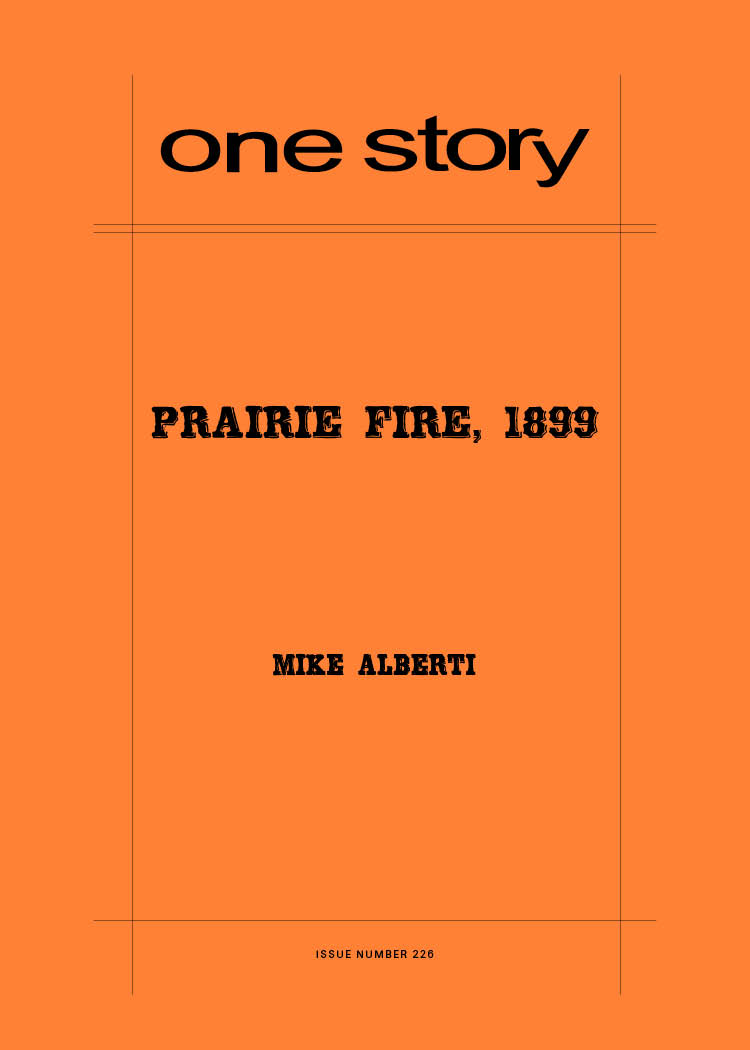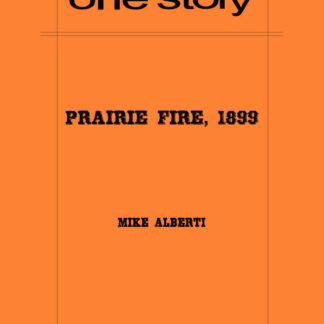
Prairie Fire, 1899
$2.50
84 in stock
Excerpt
First there was nothing, just the silent, empty prairie and the darkness lying heavy over it.
Then there was the train, the great black engine that had steamed out of Fargo and hurled itself west across the plains, making speed because its cars were empty of freight and because every hour the engineer yelled back to the stoker to keep the fire roaring. Boiling, furious, the train heaved through the night and through the liquid predawn glow and as the sun floated up over the eastern rim of the world the train was still churning west and towing that blazing globe behind it, pulling it up out of the dark. Midmorning, the train stopped in the coal town of Sims, North Dakota, where it took on four cars of brown lignite and then went on, aimed at Tacoma. Ten miles outside of Sims, the stoker cleared the ash pan, tossed the white-hot clinker out of the engine into the vacant prairie, where the wheatgrass and bluestem were October-brown and bending with a western breeze.
That breeze blew back to Sims, where it was Sunday, Sabbath.
Mike Alberti
Mike Alberti is from Albuquerque. He received his MFA in Creative Writing from the University of Minnesota. His fiction has appeared or is forthcoming in Crazyhorse, Flyway, and Gulf Coast. He lives in Minneapolis, where he is at work on a novel.
Patrick Ryan on “Prairie Fire, 1899”
When I was growing up in Florida, we would have tornados now and then. They were long and skinny, or fat and stubby, descending out of storm clouds to crack like a whip over our town, or poking down like the nose of a dog nudging a sand castle. The scariest thing about them—even scarier than their unpredictability—was their strength.
I was reminded of those tornados when I first read Mike Alberti’s “Prairie Fire, 1899.” There are no tornados in this story, but, as the title suggests, there is a fire. A wide, merciless fire. And, as we all know, fires are merciless not because they don’t want to show mercy; they’re merciless because they’re single-minded. They want only one thing: to burn.
The new issue of One Story is about the meeting of that fire and a mining community on the American frontier at the turn of the century. It has a classic, almost formal voice, and a narrator that moves from person to person with the ease of a spark carried on a breeze. In our Q&A, Mike Alberti describes it as “a sort of fable about the West.” It’s a remarkable, large-hearted short story with great staying power. We hope you enjoy it as much as we did.
Q&A by Patrick Ryan
- PR: Where did the idea for this story come from?
- MA: A couple of years, ago I wrote a bunch of stories about natural disasters. I was attracted to them as dramatic events, but also because they can evoke the precariousness of our situation here on Earth, the tenuousness of our grip on the world. Your whole life changes, everything lost in a single moment. And I find it interesting that many so-called “natural” disasters are actually caused, to some degree, by humans, which is increasingly true because of climate change. I wanted to find a way to write about that paradox. And so I was writing about floods and droughts and storms, and I got interested in prairie fires. I started reading about them and I came across an account of a prairie fire in Almont, North Dakota in 1910, and that became the very loose basis for this story.
- PR: In telling the story, you move from character to character in a very fluid way. Was it always your intension to employ an ensemble cast, or were you ever tempted to zoom in and focus on just a few characters?
- MA: I always knew I wanted the perspective to be fluid. I wanted the story to be about the community, and I wanted to show a fairly broad cross-section of that community. In earlier drafts, there were actually more characters that I was jumping between, and I spent even less time inside the head of each one. That wasn’t really working, though. I needed to let the reader get to know at least a couple of the characters and feel some attachment to them. Otherwise the stakes were pretty low.
- PR: The narrative voice is slightly formal, almost baroque. I found it very seductive. In fact, the narrator almost emerges as another character. Who do you think influenced your style in this story (if anyone)?
- MA: I’ve always loved Virginia Woolf’s sentences, and though I would never be so bold as to compare my work to hers, her style of moving between characters in To the Lighthouse was a model for this story. Also Faulkner and Cormac McCarthy for voice. Toni Morrison and Marilynne Robinson are always influences. The incredible lyricism of their sentences. I think those two write better sentences (and books, for that matter) than anyone around. And also the King James Bible, which I’d never read before but found helpful to look at when I was experimenting with the voice. Some beautiful sentences in there, too.
- PR: Can you tell us a little about the decision to incorporate God at the end?
- MA: Yeah, God kind of snuck his way in there! I think it had to do with the biblical content of the story: like floods and gardens, fires can’t really escape the biblical symbolism, so I figured I’d just try to work with it in an interesting way. And I wanted to test how far I could take the omniscient point of view, just for fun. The narrator assumes a God-like perspective throughout the story, and I liked the idea that in the final image we actually take another step back and zoom so far out that we’re watching God watch the fire. But I also think of this story as a sort of fable about the West, and I felt that the fabulous structure demanded some kind of “moral.” In one way or another, most of us subscribe to the profoundly human-centric view of the universe, in which we’re at the center of things and God is always paying very close attention to whatever foolishness we’re up to down here. But I wanted to open up the possibility of a contrasting perspective, in which all our greatest human dramas might be considered pretty trivial and uninteresting in the grander scheme of things. I hope the final image of God holds the tension between those two views, and carries the weight of the “moral.”
- PR: Do you have a favorite novel or non-fiction book about frontier life in America?
- MA: For novels, probably either Willa Cather’s My Ántonia or Cormac McCarthy’s Blood Meridian. There are also some great short stories about the West set during that time period, like Ron Hansen’s “Wickedness.” And some beautiful scenes of Kansas after the Civil War in Marilynne Robinson’s Gilead. For non-fiction, Ned Blackhawk’s Violence Over the Land and William Cronon’s Nature’s Metropolis are both amazing books that taught me a lot about white colonial settlement in the West, among other things. And I had a ton of fun reading Ian Frazier’s Great Plains.
- PR: What are you working on now?
- MA: I’m almost afraid to answer because it seems so predictable. But, truthfully, I’m in the early stages of writing an historical novel about the American West.
- PR: What is the best bit of advice about writing you have ever received?
- MA: I’ve been incredibly lucky to have many wonderfully generous, kind, and intelligent writing mentors. Some of them have told me at crucial points that not-so-good work I’d written was, well, not so good. I’ve always been grateful to them for that. So probably the best advice I’ve received is to stop doing whatever I was doing and try something different instead. When I was in college, ZZ Packer visited my school to give a reading, and somehow I had the absurd good fortune of having a manuscript conference with her. At the time, I was writing these short stories that were just totally derivative. And she called me on it. She even named the writers I was copying. I thought I was really cleverly hiding my influences, and she saw right through me. But then she told me that imitating writers you admire is not necessarily a bad thing, and can be very productive. Once you’ve done an imitation, she said, the important thing is to try to discern what’s different about your work, what your specific obsession is, what unique voice or weirdness you’ve created. Then, write into that weirdness.
